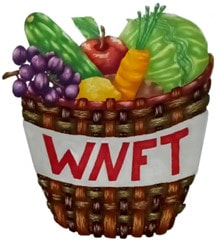Saving food today. Feeding more tomorrow.
Waste Not Food Taxi formed in 2016 to help bridge the gap between commercial edible food waste and hunger-relief program shortages. We built a team of volunteer drivers to pick up donations and deliver them to nearby emergency pantries throughout the Metro area. In 2020 when the pandemic shut down many of our donors’ operations, and simultaneously the USDA started providing farmers-to-families food boxes, WNFT shifted gears and instead of paying a salary, rented a truck every Friday to pickup excess boxes from larger agencies and deliver them directly to low-income housing, especially to elderly and disabled residents.
Soon thereafter in late 2020, we started getting approved for grants and became an Oregon Food Bank partner. We established three long-term pantries in low-income buildings (Holly Tree, Merlo Station, & Lombard Plaza), and built a pop-up pantry model to replicate throughout Washington County.
Now that the pandemic is over, Oregon Food Bank is back to doing their own pickups and we're moving on to other logistical problems we can help solve. We expect mobile and pop-up pantries to resume in September. Locations are chosen first by lowest income neighborhoods, second by inability of residents to access traditional pantries due to transportation or other barriers, and third by percentage of underserved culturally specific residents. Each pop-up also requires a commitment from the location management and a supporting traditional pantry for food storage and shared resources.
Washington County and Waste Not Food Taxi have access to four vehicles as of May 2022, including a refrigerated truck, two transit vans with installed refrigeration, and one regular cargo van. WNFT is working now to create policies and procedures for each vehicle type with the intention of maximizing efficiency and effectiveness in getting donated food to where it's most needed. Additional funding is required to supplement donated food with nutritious foods that are less available and with culturally specific foods tailored to the needs of each location.
If you'd like to partner with us in any capacity, please email [email protected]. Thank you for your support!
Soon thereafter in late 2020, we started getting approved for grants and became an Oregon Food Bank partner. We established three long-term pantries in low-income buildings (Holly Tree, Merlo Station, & Lombard Plaza), and built a pop-up pantry model to replicate throughout Washington County.
Now that the pandemic is over, Oregon Food Bank is back to doing their own pickups and we're moving on to other logistical problems we can help solve. We expect mobile and pop-up pantries to resume in September. Locations are chosen first by lowest income neighborhoods, second by inability of residents to access traditional pantries due to transportation or other barriers, and third by percentage of underserved culturally specific residents. Each pop-up also requires a commitment from the location management and a supporting traditional pantry for food storage and shared resources.
Washington County and Waste Not Food Taxi have access to four vehicles as of May 2022, including a refrigerated truck, two transit vans with installed refrigeration, and one regular cargo van. WNFT is working now to create policies and procedures for each vehicle type with the intention of maximizing efficiency and effectiveness in getting donated food to where it's most needed. Additional funding is required to supplement donated food with nutritious foods that are less available and with culturally specific foods tailored to the needs of each location.
If you'd like to partner with us in any capacity, please email [email protected]. Thank you for your support!
